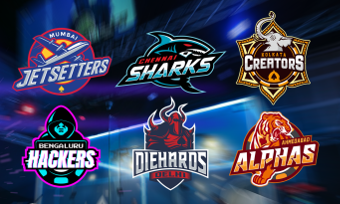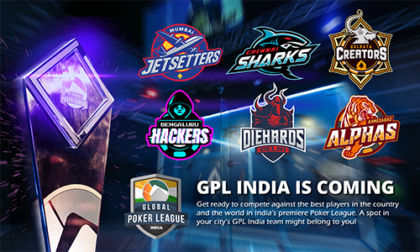Global Poker League Expands With GPL India
Mediarex S&E, owner of the Global Poker Index, announced this week the launch of Global Poker League (GPL) India, the third entry into the GPL family, following last year’s “original” GPL that featured teams from the Americas and Eurasia and this year’s GPL China.
“GPL India will take all the lessons learned in GPL’s 1st season, as well as GPL China’s current successful rollout, to create the most legitimate – and perhaps more importantly most appealing – poker competition witnessed in India until now,” wrote Mediarex founder and CEO. “This is a spectacle built to benefit the country’s poker enthusiasts and draw in fans as well. Top players from India’s national GPI rankings will be a part of this league – but while the pros will have their place, the nation’s millions-strong contingent of amateur players and poker lovers will have the opportunity to win their way into a roster spot on their local GPL India teams as well.”
 There will be six teams to start, each representing one of India’s “largest and most poker friendly cities.” The teams will be the Delhi Diehards, Mumbai Jetsetters, Bengaluru Hackers, Chennai Sharks, Kolkata Creators, and Ahmedabad Alphas.
There will be six teams to start, each representing one of India’s “largest and most poker friendly cities.” The teams will be the Delhi Diehards, Mumbai Jetsetters, Bengaluru Hackers, Chennai Sharks, Kolkata Creators, and Ahmedabad Alphas.
The winner of GPL India’s first season – the dates for which have yet to be announced – will be invited to compete against some of the top GPL teams in the GPL’s World Championships. No details of these World Championships have been revealed, either.
As mentioned, Mediarex S&E had previously announced the creation of GPL China and though the announcement was made in December, no matches have been played yet. In fact, I would wager a guess that most people reading this didn’t even realize there was a GPL China.
GPL China will consist of a dozen teams: Beijing Great Dragons, Tianjin Guardians, Shanghai Golden Tigers, Hangzhou Legends, Taiwan Black Bears, Xi’an Warriors, Chengdu Pandas, Kunming Phoenix, Shenzen Eagles, Macau Lions, Hong Kong Treasure Ships, and Guangzhou Pioneers. Unlike with the original GPL, where players were made eligible by their rank on the Global Poker Index and then team managers held a draft to select players (followed by the coaches selecting “wild card” players separate from the draft), the teams for GPL China are determined by local qualifier tournaments. Thus, the teams will not necessarily be comprised of star players. The first eight teams in the list above have filled their roster spots, with the other four to come.
In an interview with GamblingIndiaInfo.com, Dreyfus said that the team building process for GPL India will be similar to that of GPL China, with “grassroots/qualifications,” as opposed to a draft.
When asked of the challenges of the Indian poker market, Dreyfus replied, “I think that Indian Poker Industry is very small for now, likely around $50m – it’s almost a niche. But we believe there is a big potential for growth, especially through the skill game/competitive gaming angle. That’s our specialty and expertise. I read that Pokerstars is looking to invest in India, having leading international companies like them coming over will reshape the whole industry, due to their expertise and their marketing budget.”
Interestingly, though the poker industry is relatively small, the Global Poker League is entering a market that already has stiff competition. Both the Indian Poker League (IPL) and Poker Sports League (PSL) already exist in the country and both have already been gaining a following. And unlike the GPL, which owns all of its teams, the IPL and PSL follow the model we usually see in sports, with teams owned by companies and businesspeople. This likely gives them a leg up on the GPL – in addition to their first mover advantage – because of the implied financial strength.
The PSL has already played out its first season. The IPL was co-founded by the International Federation of Poker’s (IFP) Patrick Nally, whose organization created Match Poker, the type of poker upon which the IPL’s contests will be based.
In his interview with GamblingIndiaInfo.com, Dreyfus didn’t seem too worried about the competition:
Interestingly, India is one of the smallest poker markets today but the most ‘competitive’ in ‘poker leagues’. It’s healthy but also a frustration, cause there is no money to be made or to share at this stage. Operators need to understand that it is a 3 to 5 years investment, need to put millions of dollars to make it work.
Each league operator chose a specific model, I know well the PSL management, and I like them. I don’t know Raj, but I know very well MatchPoker/IFP. I don’t believe at all in that model, and I think it is flawed and doomed, unfortunately. We are in the entertainment business. I’ve been in the internet industry since 1995. The only downside of having several operators is that not all of them will survive, and when one disappears, it affects all the others negatively in term of PR. On the long-term vision, I’m not worried about our approach.
That Match Poker model which Dreyfus doesn’t like seats one player from each team at a table; teammates will occupy different seats at their tables, so no pair of teammates ever has the same seat. All players start each hand was the same number of chips and the same cards are dealt at each table. Chip stacks are reset at the end of each hand. Chip results are added up at the end of each hand and at the end of the game, the team that does the best wins.

















COMMENTS